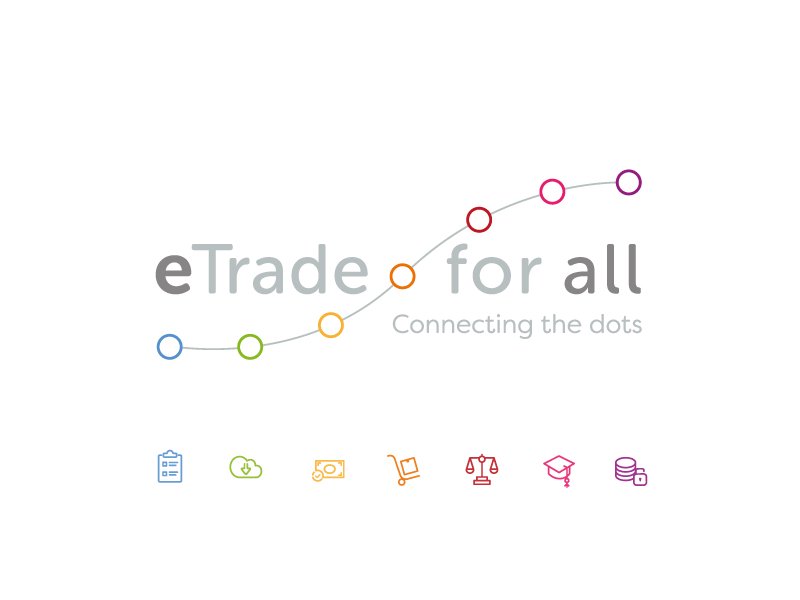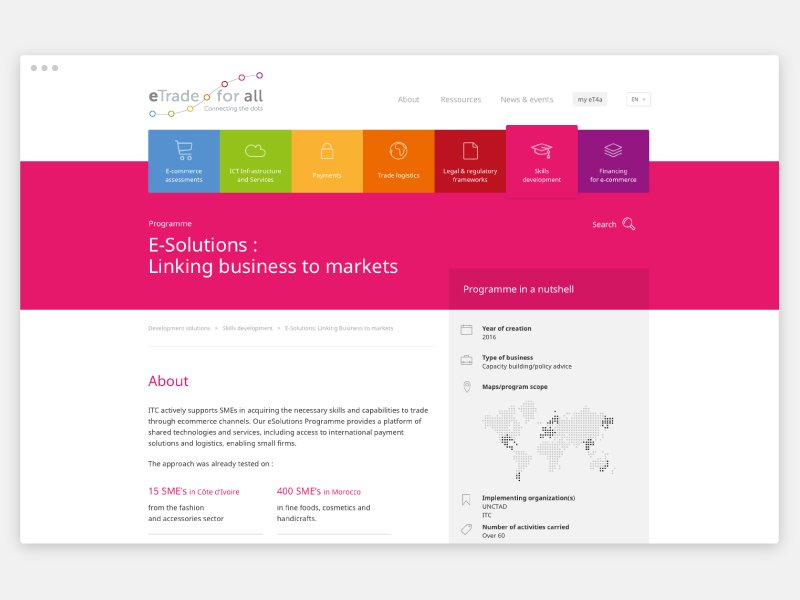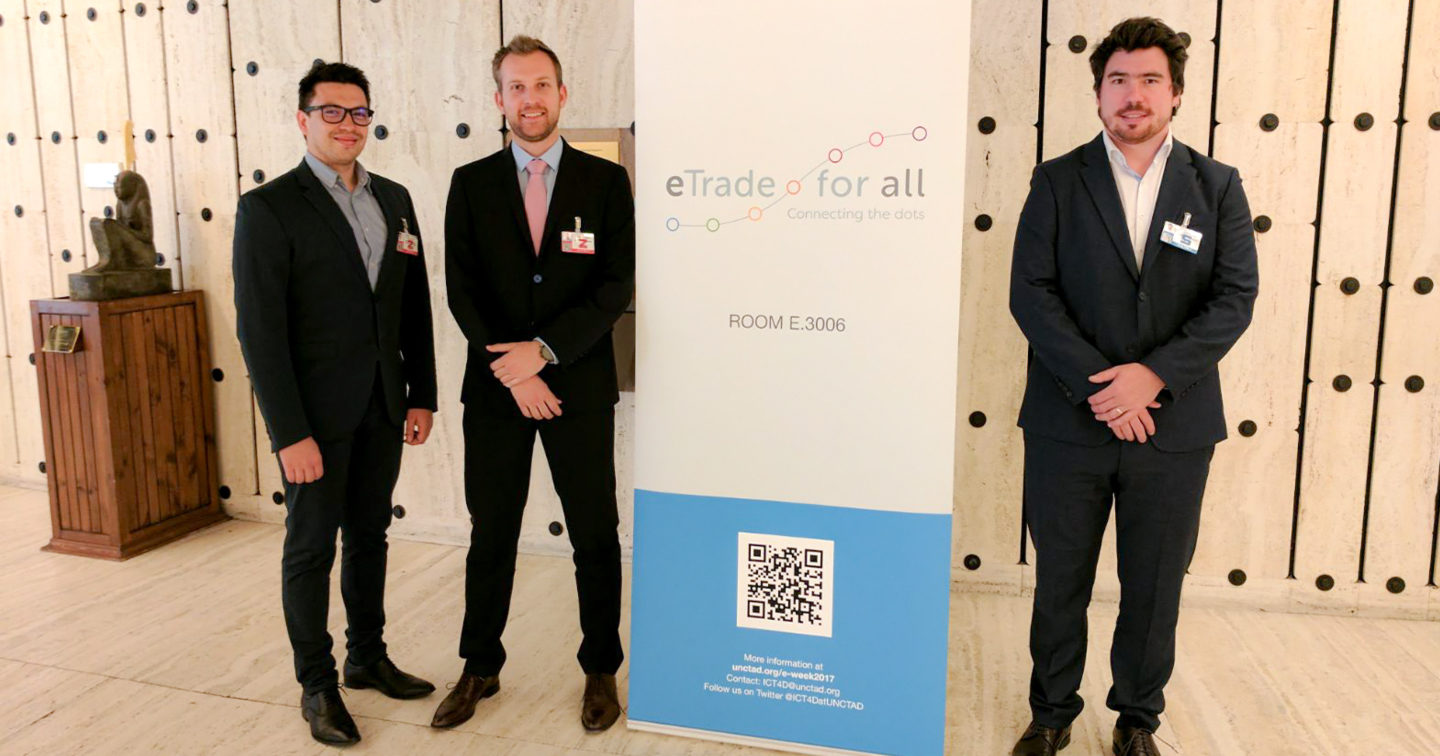E-commerce is widely recognized as a driver of innovation, economic growth and job creation. To this end, UNCTAD has launched the eTrade for All initiative to make e-commerce accessible to developing countries. The central tool of the initiative is a web platform that we designed and developed in collaboration with UNCTAD as well as 23 project partners.
Opportunities and challenges
The value of the e-commerce market is estimated by the United Nations Conference on Trade and Development (UNCTAD) at $22.1 billion in 2015. Electronic commerce and its exploitation thus represent development opportunities for many countries, particularly the least developed ones.
In order to reap the benefits of this new form of trade, however, these countries are faced with various challenges during its implementation, such as:
- Internet access and all the questions related to ICT
- payment systems and management
- delivery system and more generally the trade logistics
Picture this: As a craftswoman, you are a jewelry designer in the suburbs of Nairobi – How would you successfully promote your creations internationally?
The case study (found under “achievements”) about shopsoko illustrates in tangible terms the development possibilities offered by e-commerce.
The eTrade for all Initiative
According to UNCTAD’s data:
- More than 70% of the inhabitants in some countries such as Denmark, Luxembourg and Great Britain have now turned to e-commerce.
- In most developing countries the situation is quite different. For example, in Bangladesh, Ghana and Indonesia, 2% or less of the population are shopping online.
To address this gap, the eTrade for all initiative was created under the leadership of UNCTAD. Its purpose is to assist developing countries to seize the opportunities offered by e-commerce. The initiative was launched in July 2016 in Nairobi.
To accomplish its mission of promoting e-commerce “E-trade for all” relies on a collaborative, cross-sector and multi-institutional approach. This is why the initiative relies on partners such as international organizations, regional development banks and national agencies.

At the heart of the initiative is an online platform, which will serve as a centralized source of information to support stakeholders in developing countries as they develop e-commerce. The platform was announced and presented during UNCTAD’s E-commerce Week in Geneva.
Towards Inclusive E-Commerce
From 24th to 28th April, the third edition of the E-commerce Week was held at the Palais des Nations in Geneva. An annual event organized by UNCTAD with the central theme of the 2017 edition: “Towards Inclusive e-commerce“.
The Internet can level the playing field, enabling small businesses to compete in the global economy. https://t.co/rWXCbUvyrZ #UNCTADeWeek pic.twitter.com/r5A7eoPtOQ
— UNCTAD (@UNCTAD) April 24, 2017
The week kicked off with an interactive dialogue – “Digital Transformation for all: Empowering Entrepreneurs and Small Business” – an exchange between cabinet ministers, stakeholders and key actors from the public and private sectors. The event hosted the first gathering of all partners involved in the eTrade for All initiative. Therefore, it was the ideal setting for the launch of the platform.
Notre team avec @UNCTAD pour la présentation de la plateforme #eTrade4All lors de l'#UNCTADeweek. pic.twitter.com/Db1r0iNdmi
— Apptitude (@apptitudeCH) April 25, 2017
The eTrade for All platform is the main tool of the initiative of the same name. It’s a collaborative information hub that brings together a diverse set of resources. By providing this content, stakeholders in developing countries have simple and actionable ways to stimulate the development of e-commerce.
A wholesome project from A → Z
The design and development project of this platform was thrilling for Apptitude. We were able to support UNCTAD and their 23 partners from the beginning to the end of its development.
A conception phase focused on the platform goals
The goal of the design phase was, in collaboration with UNCTAD, to consider the most appropriate solution in terms of technology and accessibility while being aware that the platform should include the following features:
- Facilitated access to a range of information presented in the form of trends and good practices. The user finds this information in the form of”development solutions”
- The possibility to connect with potential partners for the development of e-commerce
- A visualisation of e-commerce data by country and regularly updated
- Presentation of the latest news and upcoming events
The platform is mainly based on content management rather than complex functionalities. We chose WordPress CMS, which represents a market share of nearly 30% of all websites.
A branding that appeals to its diverse users
Once the design phase was completed, the reflection on the platform’s brand image took over. The key element of this step was the understanding of the specificities of the users:
- An international, multi-cultural and multilingual audience
- Limited, sometimes obsolete means of access to the platform
This led us to reflect on the symbolism of colors, their display on older screens, as well as the search for an universal font.

An interface design that supports information display
For the design of the platform interface, the biggest challenge was to organize a significant amount of information in a legible and accessible way.
To meet this challenge, we did an extensive work on the categorization and classification of content. Subsequently, emphasis was placed on the various forms of reporting. Whether using color codes, infographics or various tabulations, with care not to overwhelm the user while browsing.

A development based on a “content builder”
The functionalities to be developed did not present any major technical challenges. We focused mainly on back-office improvements, in order to allow an easy contribution through a visual “content builder”. This is intended to facilitate the editing of content by administrators, thanks to a predefined, categorized and structured layout.
The success of the WordPress CMS also makes it a prime target for hackers. We therefore approached Navixia to guarantee the security of the platform.
A large structure and well-established processes
This initial collaboration between Apptitude and an entity with such a large organizational structure was a success. This experience allowed us to learn and comply with UNCTAD’s processes and requirements (in terms of milestone validation, reporting, security). As a result, we have learned many internal lessons that we will integrate into our future projects.
We look forward to future developments of the eTrade for All platform with the addition of new features, new forms of content presentation among other updates. You can discover more about this project in our portfolio.
Stay tuned ?!

